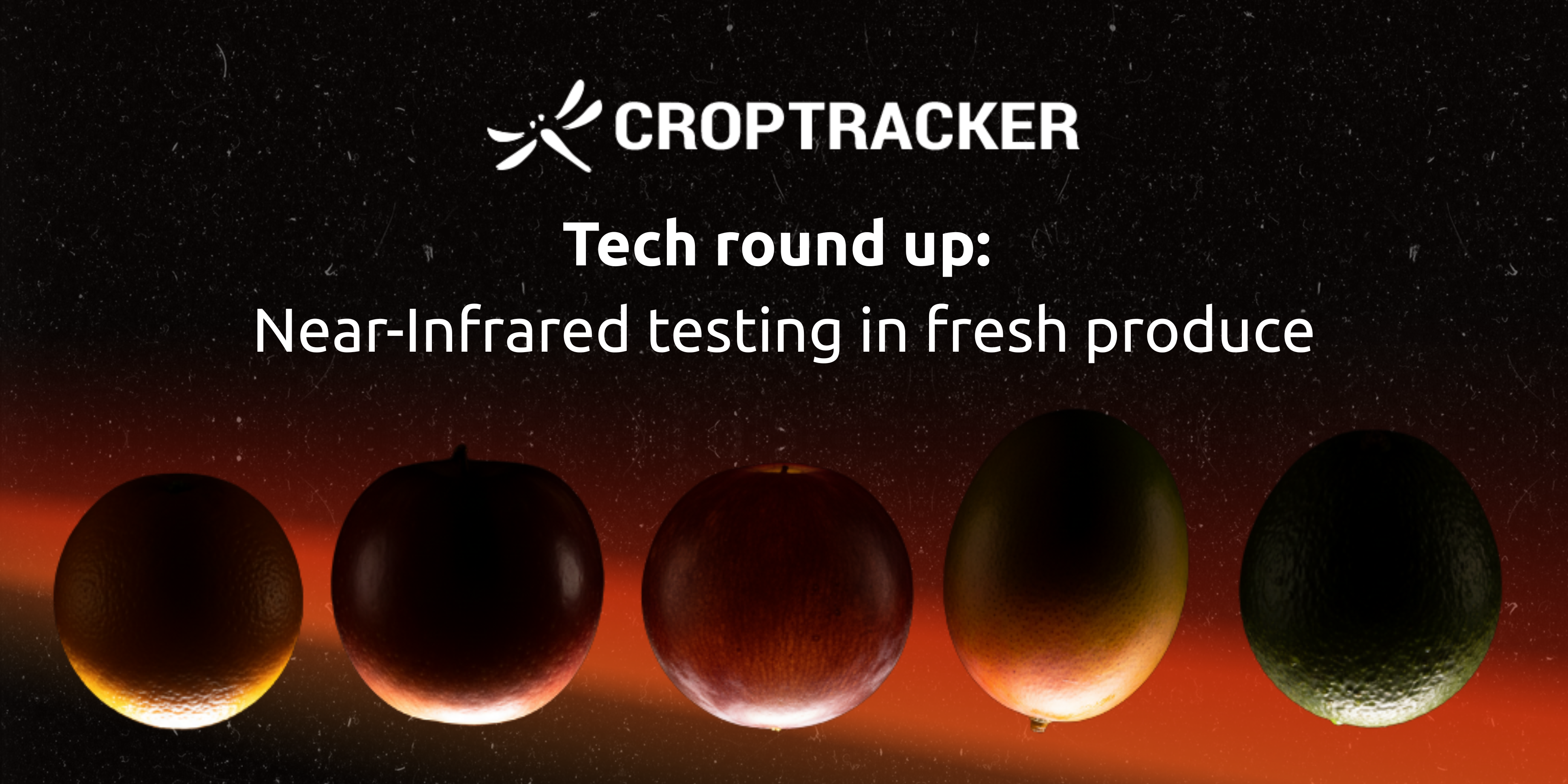Following up on our recent research for our resource page on Near-Infrared (NIR) technology for the fresh produce industry, we have created a technology round up of NIR and DA (Differential Absorbance) tools on the market today.
Quality assessment of fresh produce is undergoing rapid technological advancements, shifting from reliance on slow, destructive laboratory methods (such as penetrometers and refractometers) toward high-throughput, non-invasive spectral analysis. Though this technology is relatively new to fresh produce, several companies have jumped ahead of the curve to calibrate NIR spectrometers for fruit and vegetable analysis.
Portable NIR tools have a longer history in construction, manufacturing and geological industries. Some of the brands we will review first created NIR tools for these other industries, but a few agricultural tech manufacturers have also entered the market. We have focused this article only on hand held NIR tools, including DA meters, which have a smaller and specific functionality for chlorophyll level assessment.
DA index vs. NIR spectroscopy
Before we get into the list of tools, it is important to highlight a technology distinction. While both DA and NIR tools in this article use light, including Near-Infrared spectrum wavelengths to analyze fruit quality, they operate on different spectral principles to accomplish different functions:
- Differential Absorbance (DA) Index:
A DA meter is a specialized maturity photometer using the DA index, not a traditional compositional spectrometer, which only measures chlorophyll levels. The DA meter quantifies the difference in absorbance between 670nm (the chlorophyll absorption peak) and 720 nm (a reference wavelength). The resulting DA Index (IAD) is directly proportional to the chlorophyll content remaining in the fruit’s flesh, serving as a reliable proxy for ripeness and maturity tracking, especially in climacteric fruits like apples and pears. This fixed, narrow-band measurement is highly specific but cannot be adapted to quantify molecular composition like sugar or dry matter through chemometric modeling.
- Near-Infrared (NIR) Spectroscopy:
These systems measure the interaction of light across a wide band. The NIR region is ~800-2500nm, though some readers use visual light spectrum ranges as well, and also assess chlorophyll levels. The resulting ‘spectral fingerprint’ is analyzed to quantify molecular bonds (O-H, C-H, N-H) associated with water, sugars, acids, and proteins. This complex chemical data is interpreted by a chemometric model specifically calibrated for the use case. The data is then displayed in human interpretable QC metric scales. NIR spectroscopes for fresh produce are developed with models for their specific crop types and locations, and many offer processes for further model training for even more localized and custom calibration.

Round up of non-destructive QC tools for fresh produce
Consumers and supply chain stakeholders now demand consistent quality attributes, including optimal ripeness, firmness, brix, and dry matter (DM). Near-infrared spectroscopy addresses this demand by providing instant, non-contact measurements of internal chemistry in seconds. By utilizing advanced multivariate analysis, these instruments correlate reflected light spectra with known reference measurements to predict crucial parameters simultaneously. This capability is instrumental for optimizing harvest timing, managing cold storage, and ensuring grading consistency.
As there are only a handful of NIR tools marketed toward fresh produce, we have also included some portable NIR spectroscopes which offer custom model building support. This process generally involves collecting sample fruit, uniquely identifying them, scanning them with the NIR tool and then performing destructive testing on that fruit and feeding this to the model for training. All NIR tools in this list offer some form of custom model building. The DA tools have pre-programmed models and are not customizable.
TR Turoni DA Meter 53500, 53501, 53502
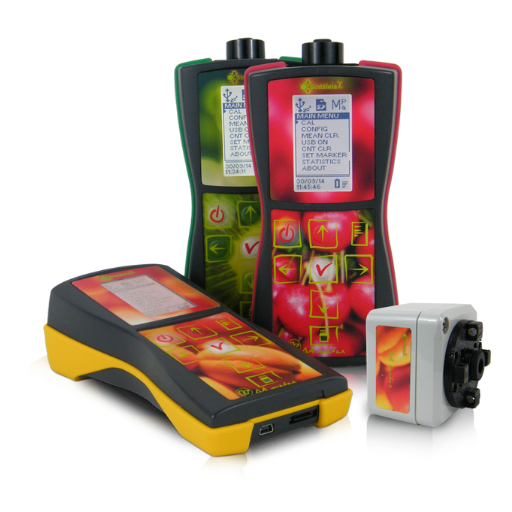
Base technology:
DA Index (Chlorophyll Absorbance)
Wavelength range:
670 & 720 nm (Narrow-band)
Sensor / detector type:
Photometer
Weight:
~ 0.32 kg
Price USD:
~ $6500.00
Battery life:
3 x 1.5V AAA batteries - run time not specified
Data storage:
2 GB Memory - USB data download
Supported crops / materials:
Pome Fruit, Stone Fruit, Kiwi, Cherries
Customizable / model control:
Fixed calibration - non-chemometric - not possible to train for data collection on new crops by the user. (This long line is here to demonstrate the wrap-below effect.)
Felix Instruments F-750, F-751
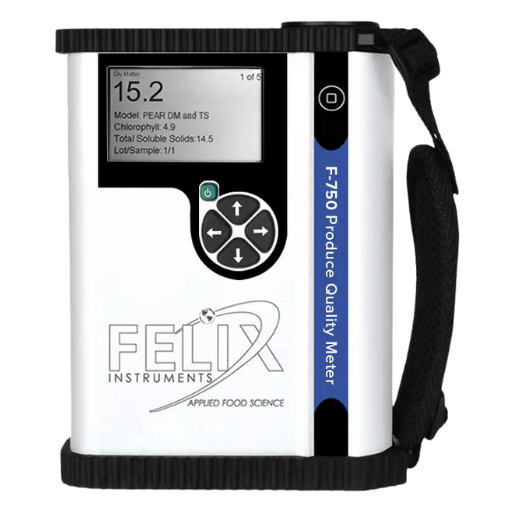
Base technology:
NIR Spectroscopy (Reflectance/Interactance)
Wavelength range:
310-1100 nm (Vis-NIR)
Sensor / detector type:
Carl Zeiss MMS-1 Spectrometer
Weight:
~ 1.05 kg
Price USD:
~ $12,000.00
Battery life:
~ 1600 measurements per charge
Data storage:
Removable 32 GB SD card
Supported crops / materials:
Mango, Pome Fruit, Kiwifruit, Avocado, Melon, Grape, Berries, Mandarin, Stone Fruit, Cherries, Onions, Pepper, Potato, Sugar Cane and Customized model building
Customizable / model control:
Highly customizable with detailed model building instructions and supporting software
Sunforest H-100C
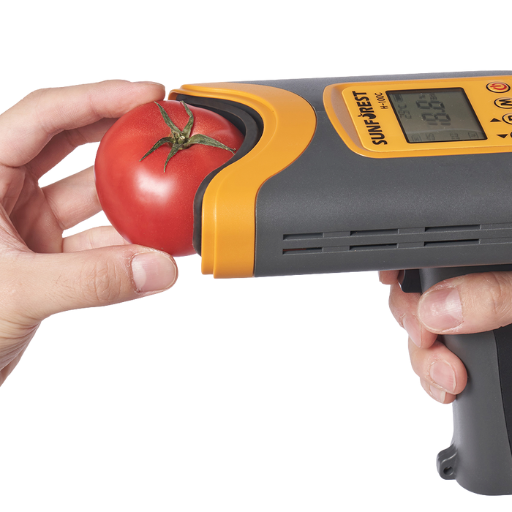
Base technology:
NIR Spectroscopy (Semi-transmissive)
Wavelength range:
640-1050 nm (Vis-NIR)
Sensor / detector type:
Enhanced CMOS Spectrometer
Weight:
~ 0.44 kg
Price USD:
~ $3500.00
Battery life:
~ 1,000 samples per charge
Data storage:
USB C-type / Bluetooth 4.1 data transfer
Supported crops / materials:
Avocado, Kiwifruit, Tomato, Mandarin, Plum, Corn, Strawberry, Potato, Apple, Peach, Mango
Customizable / model control:
Some customization with vendor support - model upgrade services offered
StellarNet ChemWiz-ADK
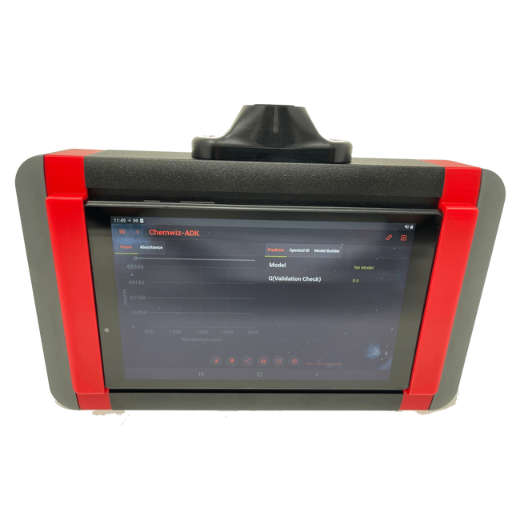
Base technology:
NIR Spectroscopy (Reflectance)
Wavelength range:
900-1700 nm (SW-NIR)
Sensor / detector type:
InGaAs Photodiode Array
Weight:
Unknown / dependent on configuration
Price USD:
~ $16,000.00
Battery life:
Lithium ion battery with ~ 8 hours charge time
Data storage:
Data logging via Android App
Supported crops / materials:
Strawberries, Mangos, Avocados, Kiwis, Melons, Grains, Forages
Customizable / model control:
Yes, customizable model building and refinement using the app
Dinamica generale X-NIR
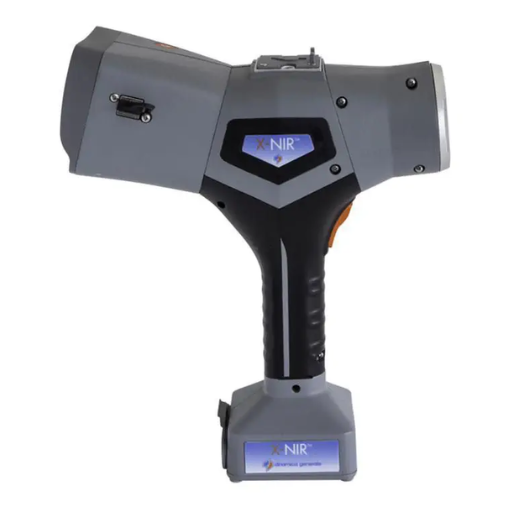
Base technology:
NIR Spectroscopy (Diffuse Reflectance)
Wavelength range:
950-1800 nm (SW-NIR)
Sensor / detector type:
InGaAs, 256 pixels
Weight:
~ 1.6 kg
Price USD:
Quote Required (forage focus - vendor should be contacted about model building options before purchasing for fresh produce use. The company has experience with NIR for fresh produce installed directly on harvesters.)
Battery life:
Rechargeable lithium ion battery with unlisted operating time
Data storage:
Internal memory/ USB stick/ WiFi
Supported crops / materials:
Forages, Grains, Silages, Corn, Wheat, Soybeans, Sorghum
Customizable / model control:
Yes, data can be uploaded to a cloud server for vendor support staff to access and develop a custom model
NIRLAB NIR LIGHT
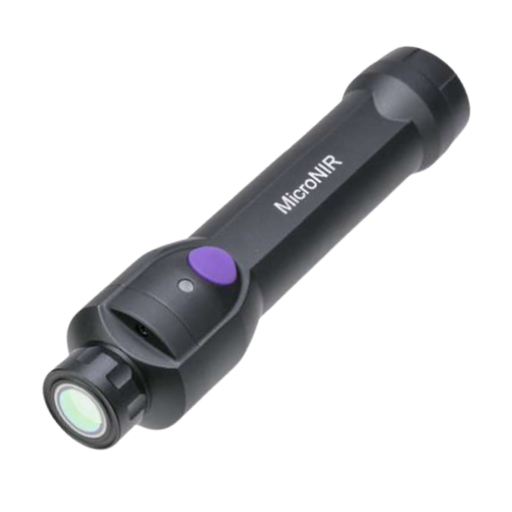
Base technology:
NIR Spectroscopy (Reflectance)
Wavelength range:
950-1650 nm (SW-NIR)
Sensor / detector type:
InGaAs Array (LVF)
Weight:
~ 0.25 kg
Price USD:
Quote Required (R&D focus - vendor should be contacted about model building options before purchasing for fresh produce use)
Battery life:
~ 10hr operating time
Data storage:
Bluetooth connectivity (CSV, SPC, Unsb)
Supported crops / materials:
Customizable for any substance; Demonstrated on Apple, Banana, Orange
Customizable / model control:
Yes, the NIR LIGHT is promoted as a product geared toward custom model building
Users prioritizing high-speed, non-destructive measurements of established parameters (DM, Brix) with an easy upgrade path should focus on the Felix F-750/F-751 or the Sunforest H-100C. The Felix system is arguably superior due to its direct software pathway and detailed instructions supporting model development and its comprehensive Vis-NIR spectral range, integrating color and composition. The Sunforest H-100C is highly portable and fast, offering vendor-assisted model upgrades and bias correction for localized use.
Users who require the highest level of model fidelity, compliance (e.g., ISO 17025 certification), and the ability to independently develop complex, novel applications (e.g., pesticide detection) should select NIRLAB NIR LIGHT or StellarNet ChemWiz-ADK. These systems utilize InGaAs detectors and the analytically superior SW-NIR range, providing more detailed spectral data for compositional analysis.
The Dinamica generale X-NIR is a viable option for users whose primary need is comprehensive forage and grain analysis (Protein, NDF, Starch) but who wish to retain the capability to develop custom fruit models on the same SW-NIR platform. While this path requires significant dedication to model development, the robust 950–1800 nm InGaAs hardware and the cloud-based calibration management system ensure long-term functionality.
The best NIR tool for your QC team depends on your crop type; your operation’s technical capabilities; and your budget. By aligning these three factors, QC teams can confidently invest in the precision NIR technology that will help them stay ahead of the curve, reducing waste, increasing profitability, and meeting the global demand for high-quality, consistent fresh produce.
